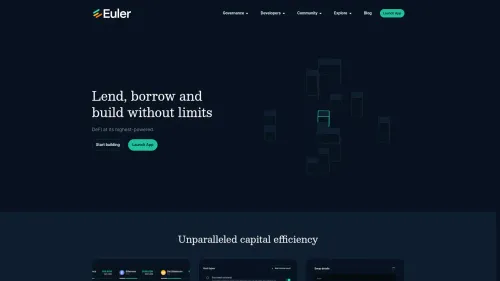Euler (EUL)
Euler is a decentralized finance (DeFi) protocol designed to facilitate lending and borrowing of a wide array of cryptocurrency assets. Unlike traditional finance systems that rely on intermediaries such as banks, Euler operates on a trustless and permissionless basis, leveraging blockchain technology to connect lenders and borrowers directly. This innovation allows users to engage with financial services without the need for trusted third-parties, thereby decentralizing financial operations and making them more accessible.
History of Euler

| Ticker | EUL |
| Category | Lending/Borrowing Protocols |
| Website | https://www.euler.finance/ |
| @eulerfinance | |
| Telegram | eulerfinance_official |
| Contract Addresses | |
|---|---|
| ethereum | 0xd9...7b Copied! Copied! |
Euler emerged as a response to the limitations observed in first-generation DeFi lending protocols such as Compound and Aave. These earlier platforms, while pioneering, were primarily designed to handle a select group of highly liquid ERC20 tokens. They employed permissioned listing systems to mitigate risks associated with lending and borrowing less liquid or more volatile assets. Euler was developed to address the unmet demand for lending and borrowing a broader spectrum of crypto assets, providing users with more options and flexibility in their financial strategies.
How Euler works
Euler employs a variety of innovative features to expand the lending and borrowing capabilities within the DeFi space. Central to its operation is the elimination of permissioned listings, allowing users to engage with a wider range of cryptocurrencies without the constraints imposed by traditional systems. This permissionless approach reduces barriers to entry for users looking to deposit tokens to earn yield or to take leveraged positions, whether long or short.
Lending and borrowing on Euler
Euler facilitates a marketplace where users can lend their crypto assets to earn interest or borrow assets by providing collateral. This is achieved through smart contracts, which are self-executing contracts with the terms of the agreement directly written into code. These smart contracts enable the seamless operation of lending and borrowing processes, ensuring that transactions are executed securely and automatically.
Risk management and features
To manage the risks associated with lending and borrowing a wide variety of assets, Euler implements several advanced features. These include dynamic interest rates, which adjust based on market conditions to incentivize borrowing and lending as needed. Euler also utilizes risk-adjusted collateral requirements, which help protect lenders by ensuring that borrowers maintain sufficient collateral to cover their positions.
Advantages of Euler
Euler's primary advantage lies in its ability to support a diverse array of crypto assets, providing users with increased opportunities to optimize their portfolios. By offering a permissionless platform, Euler lowers the entry barriers for users seeking to engage in DeFi lending and borrowing, while simultaneously enhancing the flexibility and efficiency of these processes.
Yield generation
For users looking to generate yield, Euler offers the opportunity to deposit a variety of tokens and earn interest, thus providing an incentive for participation. This feature is particularly attractive for those with idle assets, allowing them to put their holdings to work and potentially increase their returns over time.
Leveraged positions
Euler also supports leveraged positions, enabling users to amplify their exposure to specific assets. This is particularly beneficial for traders and investors looking to execute more complex strategies, such as taking advantage of market movements or hedging existing portfolios.
